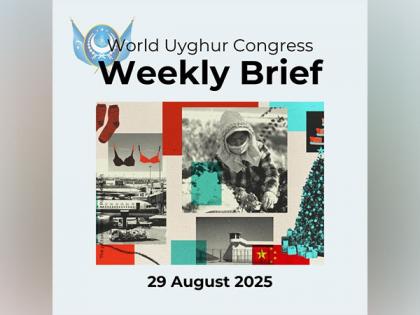WUC's weekly brief: Uyghur and Kazakh persecution sparks international alarm
By ANI | Updated: September 2, 2025 19:20 IST2025-09-02T19:18:55+5:302025-09-02T19:20:18+5:30
Washington, DC [US], September 2 : Alimnur Turganbay, a Kazakh national, was detained at the Kalzhat-Dulata border crossing on ...

WUC's weekly brief: Uyghur and Kazakh persecution sparks international alarm
Washington, DC [US], September 2 : Alimnur Turganbay, a Kazakh national, was detained at the Kalzhat-Dulata border crossing on July 23 and has since gone missing, Freedom for Eurasia reported. Turganbay has held a Kazakh passport since 2017 and formally renounced his Chinese citizenship the following year. Despite this, both the Kazakh and Chinese governments have failed to account for his whereabouts, leaving his family in distress.
Observers believe his case may be linked to that of his nephew, Serik Dauitbek, who in 2018 was handed a 17-year sentence for practicing his religion. Turganbay had spoken publicly about Dauitbek's imprisonment, including giving testimony on the Real Atajurt Volunteers YouTube channel. Human rights advocates fear his disappearance may be part of Beijing's wider crackdown, which WUC has described as a genocidal campaign targeting Uyghurs and Kazakhs.
U.S. chipmaker Intel once maintained collaborations with several Chinese surveillance companies, such as Hikvision, Uniview, and Cloudwalk, that were later sanctioned by Washington. Promotional materials show Intel's processors powering Hikvision's "Deep Eye" smart cameras, underlining the extent of integration with China's surveillance infrastructure.
The revelations are particularly striking given the U.S. government's recent announcement of plans to acquire a 10% stake in Intel. Critics argue that investing public money into a firm with a record of cooperation with companies implicated in human rights abuses raises serious ethical and political concerns. WUC has called for stronger oversight of corporate partnerships to ensure Western firms do not become complicit in the repression of Uyghurs.
The i Paper uncovered that the United Kingdom imported almost £1 billion worth of goods from East Turkistan over the past year. Records reveal direct shipments from Urumchi, ranging from clothing and personal care items to machinery and household goods.
This trade continues despite extensive documentation of state-enforced forced labour in the region and even as the UK Parliament has formally recognised Beijing's actions as genocide. Rights campaigners described the imports as "a national disgrace," urging the government to introduce tougher restrictions and enforcement measures to stop products linked to Uyghur forced labour from reaching British shelves.
The World Uyghur Congress (WUC) has stated that international accountability is urgently needed, calling on democratic governments to match their words with decisive actions.
Disclaimer: This post has been auto-published from an agency feed without any modifications to the text and has not been reviewed by an editor
Open in app